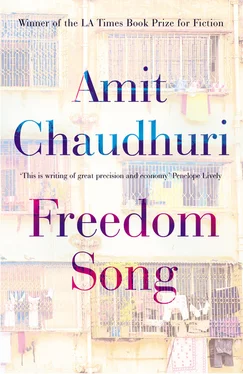He had read the book on afternoons much like this one many years ago, lying on his stomach and flicking the pages. The story he liked the best was the one about Swami Vivekananda, who was once an ordinary man called Narendranath Dutta. Narendranath wanted a simple answer to a question he had asked men of several religions — Buddhism, Christianity, Islam, Hinduism — and the question was: have you seen God? Only Ramakrishna said, ‘Yes: yes, I have seen Ma Kali!’ Testing Ramakrishna, Narendranath placed a picture of Kali under his mattress, and the saint leapt up in agony as if he had been burnt. Ramakrishna, seeing Narendranath was a great disciple, gave him the name Vivekananda, and Vivekananda, journeying to America, homeless in Chicago, and then put up by a kindly old lady, brought glory to India by addressing the Parliament of World Religions with his speech: ‘Brothers and sisters of America. .’ For a long time after, Bhaskar remembered every detail of this story, and he seemed to be there with Vivekananda when he was Narendranath and wandering from temple to church, and he entered the strange world where, with Narendranath, he met Ramakrishna, and he was there with Ramakrishna as well, when he sat in a trance and saw Kali before him, appearing little by little, her blue skin, the pink of her tongue, the black of her hair, and then becoming whole, and he came back to the real world with a little of the smoke and incense and terror still upon him. Through those days, as he walked from one room to the other in the afternoon, or came out from the toilet, he wondered if it was possible to see Saraswati or Durga or any divinity by chance, for a minute, for no reason. Then, one day, he asked an older, fifteen-year-old cousin who lived in North Calcutta, ‘What would happen if you saw a god? Is it possible?’ ‘A god?’ said the cousin. ‘Yes, like Kali or Durga. Does it ever happen?’ The cousin’s face became suddenly sad. ‘Yes it does,’ he said. ‘But those who see a god invariably die.’
In Bhaskar’s mother’s handbag lay two photographs in a white envelope. There they lay, removed from the sunlight, unless they were taken out and subjected to curious scrutiny. One was a girl from Jodhpur Park, twenty-four years old, in a printed sari, with a small smile on her face, her body in profile, and the other was in black and white, from Dum Dum, with studio lighting falling on her hair. Although her features were not perfect, it was the first girl for whom Bhaskar’s mother had a slight preference, and had let enter into her heart a tiny emotion, a small attachment, though it could not really be called emotion or attachment for these are things you feel for people you know. Perhaps it was because her face had a patience and tolerance, and her personality a seriousness that was emphasized, rather than diminished, by that small smile, the gaily printed sari denoting a kind of openness — but these were things she said to no one, not even to herself. The photographs were really for Bhaskar to look at, though he never did so properly, but glanced at them for a moment and put them away, as if they hurt his eyes. Then they had been carefully and judiciously considered by Piyu, and laughingly and embarrassedly gazed at by Bhaskar’s father, and very seriously, and not without excitement, looked at by Puti, and now they lay in the handbag again, two ordinary objects that had unexpectedly entered their lives, two paper-thin cards, called photographs, with human faces upon them.
Meanwhile, Bhaskar went each day to the factory; at other times attended his Party meetings; but most enjoyed the numerous rehearsals in the evenings for plays that would be performed on streets and even in theatres. These one- or two-act compositions possessed solemn messages, each one a parable or political allegory set in medieval India, or in an unnamed land that was sufficiently fantastic, sufficiently unreal, the citizens of this twilit world enacting events that had taken place only recently — the assassination of Rajiv Gandhi, the fragmenting of the Soviet Union, and, lately, the violence done to Muslims by Hindus. These disparate images, that had colluded somehow in Arjun Dastidar’s head, were made material and brought alive in a small room with white walls in Tollygunge, with a 100-watt bulb shining from the ceiling. Like inquisitive and loyal visitors, the sound of trams clattering back and forth outside and the spun pink-white winter smoke surrounded the players in the room and listened to their every word and every recapitulation and revision. Tender, destitute noises, of a cat meowing, and maidservants chattering and laughing as they walked by, transfigured what was beyond the wall. To Bhaskar, as he tried on a costume, or cried out in literary Bengali, ‘Alas! What was my mistake?’ (for their plays were full of aggrieved shouts and excited exclamations), there came back his childhood world of intrigue and assassinations, courage and injustice, and so, utterly convinced, he clutched his breast with his hand and fell. For what was creation but a great theatre, with swarga, with its deities in every mansion, and blue akaash, born of God’s breath, and pataal, the deep, dark, crouching abyss below, perpetually exhaling spumes of dark smoke and protesting with many voices, and, in between, man, a tiny, wonderful, living creature, travelling in his frail craft, facing, astonished but fearless, the endless, dramatic vicissitudes of pataal and swarga? Who would remember him? Blood-curdling cries emanated from the room, followed by laughter.
Confused moths wandered in from outside and settled, becoming invisible until you saw them, a small triangular patch on the wall. When they were disturbed for some inexplicable reason, they burst into life and floated hither and thither, casting shadows much larger than themselves. The wall was always full of the shadows of faces, of bodies, of the slope of shoulders, the liquid outlines of loose clothes, of shawls, of pyjamas, a play of pictures accompanying messages conveyed from one kingdom to another, and cunning murders being committed. And who were these shadows but Bhaskar, Samaresh, Sumanta, Nikhil, Dipen, robbed of their features and invested with a curious darkness and poignance, shadows where the bright white lime-painted wall became mysteriously blue? And the moths, when one noticed them, reminded one of the alleyways, of green shuttered windows with iron grilles behind them, and the perpetuity of habitation, where they lived with children, young men, fathers, mothers, resting on a wall next to a calendar with a picture of Shiv or Durga, or behind cupboards with piles of old shirts and saris, or distracting two boys as they sat down to study at their table. Such tranquillity they possessed — not a wall existed in Calcutta that would not give them repose!
And now a link was sought to be made between one person and another, between Bhaskar and a girl, who had been growing up all the while in this city, secretly, while Bhaskar had been wearing half-pants, and buying Sportsweek and reading Mandrake comics, and going to Gariahat Market with Robida to buy a water bottle, and riding on trams, his shirt clinging to his back with sweat — someone, somewhere else, was growing up as well, in as random and unpredictable a way, in a little self-absorbed world of day-to-day desire. There were so many places it could have happened — in Mandeville Gardens, in one of the lanes that surrounded the South Point School; in a nook in Jadavpur; in the half-countryside, half-urban settlement of Tollygunge; in Jodhpur Park, past Dhakuria Bridge, by the daily swell of smoke and traffic. There she had grown up, dragging her feet in chappals, wandering indolently in the veranda, making friends with girls called Bapsi and Mintu. Now it was study time, and now it was evening, with the tube-light switched on, and, all through her growing up, the city, like a great arm, had protected her, and kept her hidden and nameless.
Читать дальше












